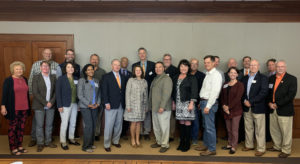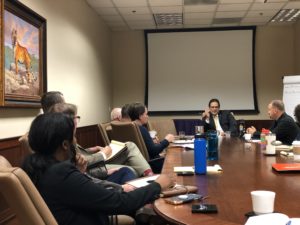When Ron Walker was first offered the job of National Park Service (NPS) Director in 1973, he turned it down.
A former chief advance man to President Nixon, Walker had traveled across the country and around the globe, making sure everything was in place before a presidential visit. He had no experience with national parks and wasn’t sure why he was offered the role.

He was told to sleep on it before making a final decision. As he talked the opportunity over with his family, he recalled his time in the military, which taught him that you don’t say “no” to the President of the United States.
He accepted the job the next morning.
Over the next two years, Walker guided the NPS through a tumultuous time that saw 14 new park areas added to its mandate, including the first two national preserves.
According to Phil Gaines, professor of practice at Clemson University and retired director of South Carolina’s state parks, Walker is a legend in the parks and conservation field for several reasons.
“Ron Walker is one of the best examples of leading under fire that you can find,” Gaines said. “He’s also known for identifying and then developing staff from throughout the NPS system that had the potential to become great leaders.”
The Ron Walker Leadership Development program at Clemson University is designed in a similar way. The program brings together new and emerging leaders from state and national parks to strengthen their critical-thinking and decision-making skills. Participants spend four days at Clemson University, working as a group to discuss challenging park management issues and how to use research to inform their decision-making process.
Clemson faculty at the Institute for Parks developed the program to build transformative and effective leaders that are ready to fill leadership roles that are becoming vacant at unprecedented rates in parks systems across the country due to an aging workforce.
The United States Office of Personnel Management’s strategic plan estimates that 30 percent of the federal workforce reached retirement age in 2018. The Department of the Interior (which houses the National Park Service) is planning for 33.6 percent of their staff to reach retirement age by 2023.
Many of those starting to look towards retirement are in leadership positions, creating a possible leadership vacuum for the National Park Service.
The leadership development program is intended to fill those gaps, says Bob Powell, director of the Institute for Parks.
“Parks are facing increasingly complex challenges, and up-and-coming leaders need a wide range of skills to develop sustainable solutions,” Powell said. “When a participant leaves this program, we want them to return to their host park ready to apply approaches they’ve learned to challenges they’re currently facing and prepare for issues they are likely to face in the future.”
The first group of park leaders completed the leadership development program in October and are already seeing an impact on how they approach key issues on the job.

Priscilla Geigis, deputy commissioner for conservation and resource stewardship at the Massachusetts Department of Conservation and Recreation, says that the program discussions have helped her look at issues a different way.
“I now want to find opportunities to use technology more regularly to gather information to help make informed decisions,” Geigis said. “I also want to collaborate with universities to not only see issues with a different lens but to also back up decisions with credible research.”
Matt Whitlow, an Outdoor Recreation Planner with the National Park Service, said that he found the discussions with researchers and practitioners in the parks field beneficial.
“Being immersed in multiple days of conversations with researchers and practitioners representing multiple levels of government agencies and learning how research is being conducted in different parks and park settings was one of the greatest benefits of the program,” Whitlow said.
Since completing the program, Whitlow has been reviewing and interpreting the laws, regulations and policies associated with his core responsibilities to ensure the work he does is rooted in both fidelity to the law and serves the long-term public interest.
Planning is currently underway for the second class of park leaders, who will attend the program at Clemson University in October 2020.
Geigis says one of the most valuable lessons she took away from the week was the need for park leaders to navigate change in a way that ensures parks can stay relevant while maintaining the park system’s core values.
“Being part of a rich legacy of park professionals is an honor, privilege and responsibility,” Geigis said. “I was impressed to meet with key leaders in the profession and hear them share their stories and offer advice about both navigating challenges and recognizing and seizing opportunities.”
